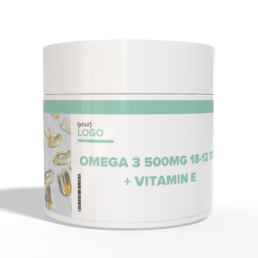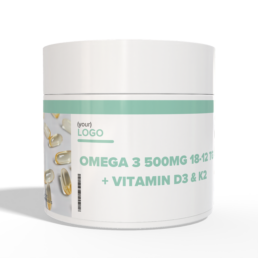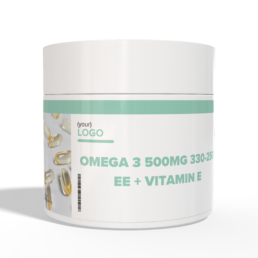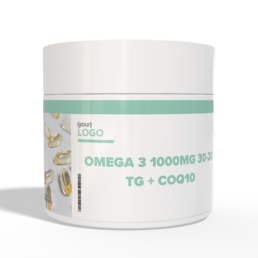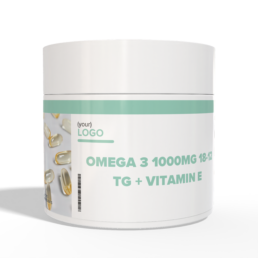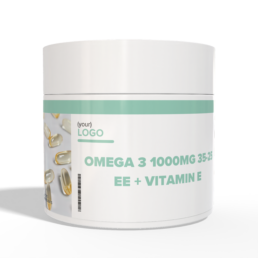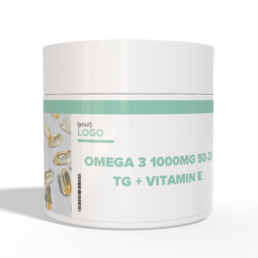Omega-3
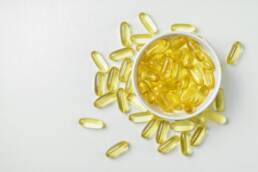
What is Omega-3: EPA and DHA?
Omega-3 fatty acids are a group of polyunsaturated fatty acids that are crucial for various bodily functions. Since the human body cannot produce these fatty acids on its own, they must be obtained through diet or supplements. The three main omega-3 fatty acids are alpha-linolenic acid (ALA), eicosapentaenoic acid (EPA), and docosahexaenoic acid (DHA).
ALA (Alpha-Linolenic Acid): ALA is primarily found in plant sources such as flaxseeds, chia seeds, walnuts, and some vegetable oils. While ALA is important, it must be converted into EPA and DHA in the body to provide the same health benefits. This conversion is inefficient, making it necessary to consume EPA and DHA through diet or supplements.
EPA (Eicosapentaenoic Acid) and DHA (Docosahexaenoic Acid): These fatty acids are mainly found in fatty fish such as salmon, mackerel, sardines, and herring. EPA is known for its anti-inflammatory properties, while DHA is essential for the development and maintenance of the nervous system and brain function. Both fatty acids play a key role in cardiovascular health, cognitive functions, and regulating inflammation.
Importance
The Importance of Omega-3 and the Role of Fish Oil Supplements
Omega-3 fatty acids are vital for maintaining good health. They help regulate inflammatory processes, which is essential for preventing chronic inflammatory conditions such as arthritis and certain autoimmune diseases. Additionally, they support cardiovascular health by promoting a healthy blood pressure and by reducing the risk of heart disease. Recent studies show that higher intake of omega-3 fatty acids is associated with a lower risk of cardiovascular diseases.
In terms of brain health, DHA and EPA are crucial for the development of the nervous system and maintaining cognitive functions throughout life. DHA is a key structural component of the brain and eyes, and a deficiency in these fatty acids has been linked to an increased risk of neurodegenerative diseases such as Alzheimer’s disease and other forms of dementia. Furthermore, omega-3 fatty acids are associated with improved mood and reduced symptoms of depression and anxiety.
However, many people do not get enough omega-3 fatty acids through their daily diet, especially if they consume little or no fish. Omega-3 supplements, such as fish oil, can help fill this gap. Fish oil is a popular source of EPA and DHA and is often used to increase intake of these important fatty acids. These supplements can support cardiovascular health, improve brain function, and contribute to overall joint and immune system health.
What to Consider
What to Consider When Choosing Omega-3 Supplements
When choosing an omega-3 supplement, it’s important to consider several factors that can affect the quality, effectiveness, and sustainability of the product:
Sustainability: Opt for fish oil sourced from sustainable fisheries to avoid overfishing and protect marine ecosystems. Certifications such as those from the Marine Stewardship Council (MSC) or Friends Of the Sea (FOS) can help with this.
Source of Fish: The geographic origin of the fish can affect the purity of the oil. Fish from clean, cold-water environments typically have lower levels of contaminants. Choose fish oil from areas with low pollution levels to minimize the risk of contamination.
Testing for Contaminants: It is crucial that the fish oil is thoroughly tested for contaminants such as heavy metals, polychlorinated biphenyls (PCBs), and dioxins.
Extraction Method: The quality of omega-3 oil is influenced by the extraction method. Traditional methods using heat and chemicals can cause oxidation and loss of bioactivity.
- CO2 extraction, using supercritical CO2, minimizes oxidation and preserves purity.
- Molecular distillation increases the concentration of omega-3 fatty acids and removes impurities through the use of vacuum and controlled temperatures.
Totox Value: The Totox value, which combines peroxide and anisidine values, indicates the oxidation status of omega-3 oil. A low Totox value means less oxidation and higher quality. High Totox values can lead to a strong fishy odor and burps. It is important to maintain a low Totox value for optimal potency and user experience of omega-3 supplements.
Storage: Omega-3 fatty acids are prone to oxidation, which can result in a rancid smell and taste, as well as reduced effectiveness of the supplement.
Form of Omega-3: Omega-3 supplements come in different chemical forms, including ethyl esters and triglycerides. Triglycerides are the natural form in which omega-3 fatty acids are found in food and are better absorbed and metabolized by the body. Ethyl esters are chemically modified to allow for higher concentrations of EPA and DHA, but they may be less efficiently absorbed by the body. For optimal absorption and effectiveness, it’s important to know which form the supplement is in.
Recommended Intake
Recommended Intake of EPA and DHA
The recommended daily intake of EPA and DHA can vary depending on individual health needs and goals:
For general heart health, European dietary guidelines typically recommend consuming 2 to 3 servings of fatty fish per week, which is roughly equivalent to about 250 mg of EPA and DHA per day.
For those with an increased risk of cardiovascular disease, a daily intake of 500 to 1,000 mg of EPA and DHA is often recommended.
Pregnant and breastfeeding women are advised to aim for around 200 mg of DHA daily to support fetal brain and eye development. Ask your doctor for advice.
Higher doses of 1,000 to 2,000 mg of EPA and DHA per day may be beneficial for managing inflammatory conditions, but such doses should be taken under medical supervision.
Conclusion
Omega-3 fatty acids are essential for maintaining good health, with benefits ranging from cardiovascular support to promoting brain function and regulating inflammation. Since it can be challenging to get enough omega-3 from diet alone, supplements like fish oil can be a valuable addition. When choosing an omega-3 supplement, it is crucial to consider sustainability, origin, purity, extraction methods, Totox value, and the form of omega-3. By taking these factors into account, you can ensure that you choose a supplement that is both effective and of high quality.
References
References
- Ahmed, T., & Kim, K. H. (2020). Omega-3 fatty acids and their effects on cardiovascular disease: A review of the literature. Journal of Clinical Medicine, 9(4), 1238.
- De Oliveira, A. M., & Calder, P. C. (2021). Omega-3 Fatty Acids and Inflammatory Diseases: A Review. Nutrients, 13(7), 2160.
- Gajos, G., & Krenek, M. (2022). The Impact of Omega-3 Fatty Acids on Cognitive Function and Mood Disorders. Nutrients, 14(1), 234.
- Grosso, G., & Micek, A. (2019). Omega-3 Fatty Acids and Risk of Chronic Diseases: A Review of the Literature. Nutrients, 11(3), 505.
- Harris, W. S., & Pottala, J. V. (2018). Omega-3 Index and Total Mortality: A Meta-analysis. Journal of Clinical Lipidology, 12(2), 535-540.
- Schmitz, G., & Ecker, J. (2008). The Role of Omega-3 Fatty Acids in Cardiovascular Disease. The Journal of Clinical Lipidology, 2(1), 26-39.
Related Products
How to read extract ratios?
Misunderstandings on what plant-to-extract ratios signify are common. These ratios are often thought to indicate the amount of active ingredient present or the purity of the extract. These are both common misinterpretations of plant-to-extract ratio’s. This blog post will tell you more about what these plant-to-extract ratios actually mean.
Protein content determination: is it always accurate?
Products containing protein are required to list the protein content on their nutritional labels. The determination and calculation of this protein content are commonly performed using the Kjeldahl method. This method measures the amount of nitrogen in the product to estimate its protein content. This blog will explain the Kjeldahl method and assess its accuracy.
Gastro-resistance explained
Nowadays dietary supplements are occasionally labelled gastro-resistant. Often the question arises what does gastro-resistant mean and what is it good for? This blog will give more insight into gastro-resistant supplements and their benefits.
Liposomes in sports nutrition
Originating from the drug industry, liposomes are now making their way into the world of food supplements. Liposomes are renowned for their role in targeted supplement delivery within the body. But what are liposomes?
The Ultimate Recovery Drink after Sports
Post-workout recovery is essential for athletes across various disciplines to replenish energy stores, repair muscles, and optimize performance. Whether you're an endurance runner, a strength athlete, or engaged in intermittent sports, the ideal recovery drink can make a significant difference in your recovery process. In this guide, we'll explore the key components necessary for crafting the perfect recovery drink tailored to the specific demands of endurance, strength, and intermittent sports.
Private Label Clear Vegan Protein
We are happy to unveil our latest product innovation – Clear Vegan Protein, designed to meet the evolving demands of the health and wellness market. This formula offers a refreshing and customizable alternative to traditional plant-based proteins, making it an ideal addition to your product lineup. Need help to kickstart your next Private Label Clear Vegan Protein? Let us help you to produce it.


